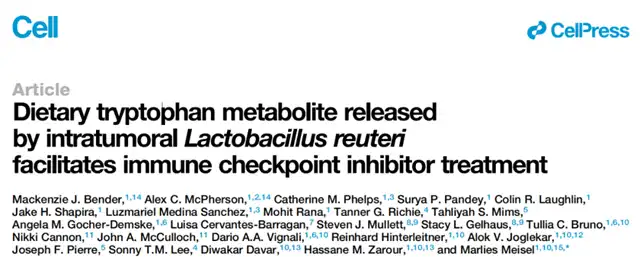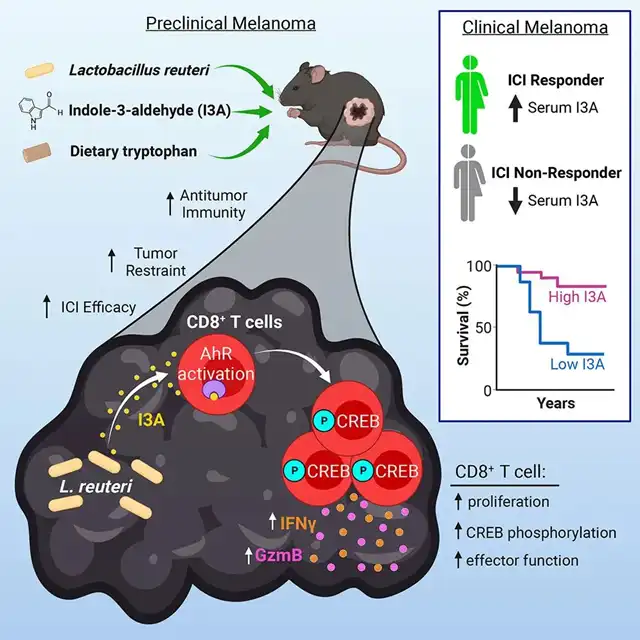Gut Bacteria Enhance Cancer Immunotherapy: Study Reveals Potential Role of Lactobacillus reuteri
- Normal Liver Cells Found to Promote Cancer Metastasis to the Liver
- Nearly 80% Complete Remission: Breakthrough in ADC Anti-Tumor Treatment
- Vaccination Against Common Diseases May Prevent Dementia!
- New Alzheimer’s Disease (AD) Diagnosis and Staging Criteria
- Breakthrough in Alzheimer’s Disease: New Nasal Spray Halts Cognitive Decline by Targeting Toxic Protein
- Can the Tap Water at the Paris Olympics be Drunk Directly?
Gut Bacteria Enhance Cancer Immunotherapy: Study Reveals Potential Role of Lactobacillus reuteri
- Should China be held legally responsible for the US’s $18 trillion COVID losses?
- CT Radiation Exposure Linked to Blood Cancer in Children and Adolescents
- FDA has mandated a top-level black box warning for all marketed CAR-T therapies
- Can people with high blood pressure eat peanuts?
- What is the difference between dopamine and dobutamine?
- How long can the patient live after heart stent surgery?
Gut Bacteria Enhance Cancer Immunotherapy: Study Reveals Potential Role of Lactobacillus reuteri
Our bodies harbor a vast ecosystem of symbiotic microorganisms, particularly in the gut, which has been found to play a crucial role in influencing various aspects of human health.
A recent study published in the journal Cell on April 6, 2023, by researchers from the University of Pittsburgh sheds light on the potential of a specific probiotic, Lactobacillus reuteri, in boosting the effectiveness of cancer immunotherapy.

The research demonstrates that Lactobacillus reuteri, a beneficial bacterium found in the tumor microenvironment, releases a compound known as indole-3-aldehyde (I3A).
This compound has been shown to stimulate cytotoxic T cells, enhancing the efficacy of cancer immunotherapy.
In experiments involving mice fed a tryptophan-rich diet (metabolized by Lactobacillus reuteri into I3A), improved outcomes were observed, including better tumor suppression and extended survival.
The findings pave the way for potential clinical trials to test the therapeutic effects of I3A or a combination of probiotics and dietary interventions to enhance cancer immunotherapy.
The gut, a vital digestive organ, also emerges as a pivotal component of the immune system. The intricate relationship between gut microbiota and the immune system has been a subject of growing interest, especially in the context of challenging diseases such as cancer.
In a study involving mice with melanoma, the research team fed them Lactobacillus reuteri, a common probiotic. The probiotic migrated from the gut to the tumor tissue, demonstrating persistent growth within the tumor over time.
Crucially, mice injected with Lactobacillus reuteri exhibited increased CD8+ T cells (cytotoxic T cells) at the tumor site, leading to more pronounced tumor shrinkage and extended lifespans compared to the control group. Additionally, this probiotic showed tumor-inhibiting effects across various cancer types in mice, including melanoma, adenocarcinoma, fibrosarcoma, and breast cancer.
Further investigation revealed that Lactobacillus reuteri stimulates anti-tumor immune responses by secreting I3A. This compound activates the AhR signaling pathway in CD8+ T cells, promoting interferon-γ production and cancer cell destruction. The specificity of I3A for CD8+ T cells enhances their anticancer capabilities.
Confirming this, when the research team removed the AhR receptors from CD8+ T cells, Lactobacillus reuteri failed to induce anti-tumor immune responses. Additionally, using a strain of Lactobacillus reuteri incapable of producing I3A underscored the crucial role of this compound in enhancing anti-tumor immunity and suppressing tumor growth.
It’s noteworthy that Lactobacillus reuteri requires the intake of tryptophan, an amino acid abundant in foods like chicken, soy, oats, nuts, and seeds, to release the anti-tumor compound I3A. Mice with melanoma fed a tryptophan-rich diet experienced slower tumor growth and longer lifespans compared to those with a low-tryptophan diet. Moreover, a diet rich in tryptophan strengthened the inhibitory effects of immunotherapy on tumors.
Analyzing blood samples from melanoma patients undergoing immune checkpoint inhibitor therapy, the researchers found that patients with higher levels of I3A responded better to immunotherapy. Elevated pre-treatment levels of I3A were also associated with improved survival chances.
Professor Marlies Meisel, the corresponding author of the study, suggests that I3A levels could potentially serve as a biomarker to predict which patients may respond to immunotherapy. Moreover, I3A could be used as an immunotherapy adjuvant to enhance patient prognosis.

In summary, this Cell paper suggests that Lactobacillus reuteri, through the secretion of I3A, stimulates CD8+ T cells, promoting the immunotherapeutic killing of tumors.
Tryptophan-rich foods may play a dietary role in improving the prognosis of cancer patients. However, these early-stage research findings require further validation, including clinical trials, to ascertain whether a tryptophan-rich diet genuinely influences the prognosis of cancer patients.
Link to the paper: https://doi.org/10.1016/j.cell.2023.03.011
Gut Bacteria Enhance Cancer Immunotherapy: Study Reveals Potential Role of Lactobacillus reuteri
(source:internet, reference only)
Disclaimer of medicaltrend.org
Important Note: The information provided is for informational purposes only and should not be considered as medical advice.



